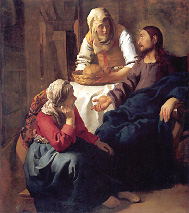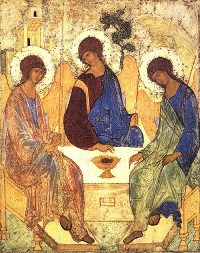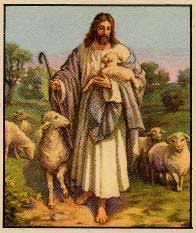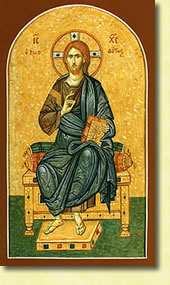Genesis 18: 1-14
Colossians 1: 21-29
Luke 10: 38-42
 There are two stories of divine hospitality in this morning’s readings. The first is the story of the three mysterious visitors to Abraham, one of whom is designated as “The LORD.” There is an Orthodox icon of this event where the three visitors are portrayed as angels; the alternate name for the icon is “The Old Testament Trinity,” and each one of the three figures of the icon is identified as one of the members of the Trinity – the Father, the Son, and the Holy Spirit. That the doctrine of the Trinity was on the mind of the author of Genesis is unlikely, but the point is the same. These three visitors are not just ordinary visitors. This is a personal visit from God to Abraham. God is, as it were, Abraham’s guest.
There are two stories of divine hospitality in this morning’s readings. The first is the story of the three mysterious visitors to Abraham, one of whom is designated as “The LORD.” There is an Orthodox icon of this event where the three visitors are portrayed as angels; the alternate name for the icon is “The Old Testament Trinity,” and each one of the three figures of the icon is identified as one of the members of the Trinity – the Father, the Son, and the Holy Spirit. That the doctrine of the Trinity was on the mind of the author of Genesis is unlikely, but the point is the same. These three visitors are not just ordinary visitors. This is a personal visit from God to Abraham. God is, as it were, Abraham’s guest.
The second reading is the gospel reading, and it has a similar structure. Jesus visits the home of Mary and Martha, where Martha serves, and Mary sits at Jesus’ feet and listens. This story also has enjoyed a traditional interpretation in the history of the church. Martha has been perceived as an example of the active life, the life of those who must do physical work for a living; and Mary has been portrayed as the example of the contemplative life, that is, of those religious orders who gave themselves over to prayer and contemplation rather than to active service. So Christians have managed to find a way to take a biblical story that challenged Martha’s one-up-manship of Mary, and turn it into a way where they could identify with Mary to encourage one-up-manship over those whom they identified with Martha.
But I do not think that the story is primarily about Mary and Martha, who are the hosts, but about Jesus, who is the Guest. What is God like when God comes to visit us? This side of the resurrection we know the identity of the Divine Guest. Jesus is not just any visitor to Mary and Martha. He is the Son of God, God come among us as a human being. So, once again, God is, as it were, a Guest. This time, God, the Son of God, is the Guest of Mary and Martha. (more…)












